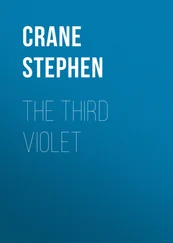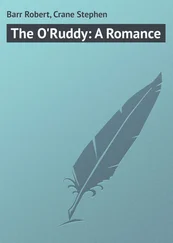The infantry was moving steadily a-field. Black blocks of men were trailing in column slowly over the plain. They were not unlike the backs of dominoes on a green baize table ; they were so vivid, so startling. The correspondent and his servant followed them. Eventually they overtook two companies in command of a captain, who seemed immensely glad to have the strangers with him. As they marched, the captain spoke through the dragoman upon the virtues of his men, announcing with other news the fact that his first sergeant was the bravest man in the world.
A number of columns were moving across the plain parallel to their line of march, and the whole force seemed to have orders to halt when they reached a long ditch about four hundred yards from where the shore of the plain arose to the luxuriant groves with the cupola of the big white house sticking above them. The soldiers lay along the ditch, and the bravest man in the world spread his blanket on the ground for the captain, Coleman and himself. During a long pause Coleman tried to elucidate the question of why the Greek soldiers wore heavy overcoats, even in the bitter heat of midday, but he could only learn that the dews, when they came, were very destructive to the lungs, Further, he convinced himself anew that talking through an interpreter to the minds of other men was as satisfactory as looking at landscape through a stained glass window.
After a time there was, in front, a stir near where a curious hedge of dry brambles seemed to outline some sort of a garden patch. Many of the soldiers exclaimed and raised their guns. But there seemed to come a general understanding to the line that it was wrong to fire. Then presently into the open came a dirty brown figure, and Coleman could see through his glasses that its head was crowned with a dirty fez which had once been white. This indicated that the figure was that of one of the Christian peasants of Epirus. Obedient to the captain, the sergeant arose and waved invitation. The peasant wavered, changed his mind, was obviously terror-stricken, regained confidence and then began to advance circuitously toward the Greek lines. When he arrived within hailing dis- tance, the captain, the sergeant, Coleman's dragoman and many of the soldiers yelled human messages, and a moment later he was seen to be a poor, yellow-faced stripling with a body which seemed to have been first twisted by an ill-birth and afterward maimed by either labour or oppression, these being often identical in their effects.
His reception of the Greek soldiery was no less fervid than their welcome of him to their protection. He threw his grimy fez in the air and croaked out cheers, while tears wet his cheeks. When he had come upon the right side of the ditch he ran capering among them and the captain, the sergeant, the dragoman and a number of soldiers received wild embraces and kisses. He made a dash at Coleman, but Coleman was now wary in the game, and retired dexterously behind different groups with a finished appearance of not noting that the young man wished to greet him.
Behind the hedge of dry brambles there were more indications of life, and the peasant stood up and made beseeching gestures. Soon a whole flock of miserable people had come out to the Greeks, men, women and children, in crude and comic smocks, prancing here and there, uproariously embracing and kissing their deliverers. An old, tearful, toothless hag flung herself rapturously into the arms of the captain, and Coleman's brick-and-iron soul was moved to admiration at the way in which the officer administered a chaste salute upon the furrowed cheek. The dragoman told the correspondent that the Turks had run away from the village on up a valley toward Jannina. Everybody was proud and happy. A major of infantry came from the rear at this time and asked the captain in sharp tones who were the two strangers in civilian attire. When the captain had answered correctly the major was immediately mollified, and had it announced to the correspondent that his battalion was going to move immediately into the village, and that he would be delighted to have his company.
The major strode at the head of his men with the group of villagers singing and dancing about him and looking upon him as if he were a god. Coleman and the dragoman, at the officer's request, marched one on either side of him, and in this manner they entered the village. From all sorts of hedges and thickets, people came creeping out to pass into a delirium of joy. The major borrowed three little pack horses with rope-bridles, and thus mounted and followed by the clanking column, they rode on in triumph.
It was probably more of a true festival than most men experience even in the longest life time. The major with his Greek instinct of drama was a splendid personification of poetic quality; in fact he was himself almost a lyric. From time to time he glanced back at Coleman with eyes half dimmed with appreciation. The people gathered flowers, great blossoms of purple and corn colour. They sprinkled them over the three horsemen and flung them deliriously under the feet of the little nags. Being now mounted Coleman had no difficulty in avoiding the embraces of the peasants, but he felt to the tips of his toes an abandonment to a kind of pleasure with which he was not at all familiar. Riding thus amid cries of thanksgiving addressed at him equally with the others, he felt a burning virtue and quite lost his old self in an illusion of noble be. nignity. And there continued the fragrant hail of blossoms.
Miserable little huts straggled along the sides of the village street as if they were following at the heels of the great white house of the bey. The column proceeded northward, announcing laughingly to the glad villagers that they would never see another Turk. Before them on the road was here and there a fez from the head of a fled Turkish soldier and they lay like drops of blood from some wounded leviathan. Ultimately it grew cloudy. It even rained slightly. In the misty downfall the column of soldiers in blue was dim as if it were merely a long trail of low-hung smoke.
They came to the ruins of a church and there the major halted his battalion. Coleman worried at his dragoman to learn if the halt was only temporary. It was a long time before there was answer from the major, for he had drawn up his men in platoons and was addressing them in a speech as interminable as any that Coleman had heard in Greece. The officer waved his arms and roared out evidently the glories of patriotism and soldierly honour, the glories of their ancient people, and he may have included any subject in this wonderful speech, for the reason that he had plenty of time in which to do it. It was impossible to tell whether the oration was a good one or bad one, because the men stood in their loose platoons without discernible feelings as if to them this appeared merely as one of the inevitable consequences of a campaign, an established rule of warfare. Coleman ate black bread and chocolate tablets while the dragoman hovered near the major with the intention of pouncing upon him for information as soon as his lungs yielded to the strain upon them.
The dragoman at last returned with a very long verbal treatise from the major, who apparently had not been as exhausted after his speech to the men as one would think. The major had said that he had been ordered to halt here to form a junction with some of the troops coming direct from Arta, and that he expected that in the morning the army would be divided and one wing would chase the retreating Turks on toward Jannina, while the other wing would advance upon Prevasa because the enemy had a garrison there which had not retreated an inch, and, although it was cut off, it was necessary to send either a force to hold it in its place or a larger force to go through with the business of capturing it. Else there would be left in the rear of the left flank of a Greek advance upon Jannina a body of the enemy which at any moment might become active. The major said that his battalion would probably form part of the force to advance upon Prevasa. Nikopolis was on the road to Prevasa and only three miles away from it.
Читать дальше












